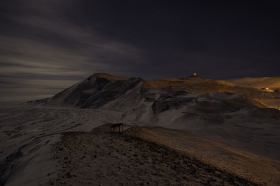Longest Day in the North...Shortest in the South

As most people on Earth celebrate the Summer Solstice yesterday by enjoying a few extra minutes of sunlight, our fellow global brethren in the South celebrated their shortest day of the year. Typically the solstice is on June 21st, but 2012 was a leap year so it is one day before. For those poor unfortunate souls studying the ice in Antarctica, June 20th was the absolute darkest day of the year. However, if you were to ask the team of British researchers working for the British Antarctic Survey, it was not such a gloomy day. For them and other nationalities at the south pole, it was holiday, started a hundred years ago by Captain Robert Falcon Scott. It was Midwinter's Day, and revelers celebrated the fact that from this point on, the nights will only be getting shorter.
Midwinter's Day, known as Midsummer's Day in the UK, is a strong tradition within the Antarctic community. It is akin to Christmas in Antarctica. The holiday that is currently Christmas began as the midwinter celebration of pagan peoples in Europe. This does not fit will with folks on the southern hemisphere, as this is their midsummer day. During this time, scientists are usually working hard, as it is in the middle of their busiest season.
So Christmas in Antarctica falls on the northern hemisphere's summer solstice. Researchers take the day off if they can, share in a feast, and possibly have a few drinks.
Most of the celebrations took place indoors as the outdoors was far too treacherous. Temperatures can plunge to as low as -30 degrees C and there are extremely high winds. Add to that a bit of permanent darkness and the outdoor is not the place to be. At this time of year, the Antarctic researchers have not seen the sun in about a month.
But it is at this point that the trend is reversed. The days grow longer, and the countdown is on to see the sun again. It will only take one more month. That is a real cause for celebration!
A History of Midwinter Celebrations in Antarctica can be found here.
Image credit: United States Antarctic Program
©2012. Copyright Environmental News Network To subscribe or visit go to: http://www.enn.com